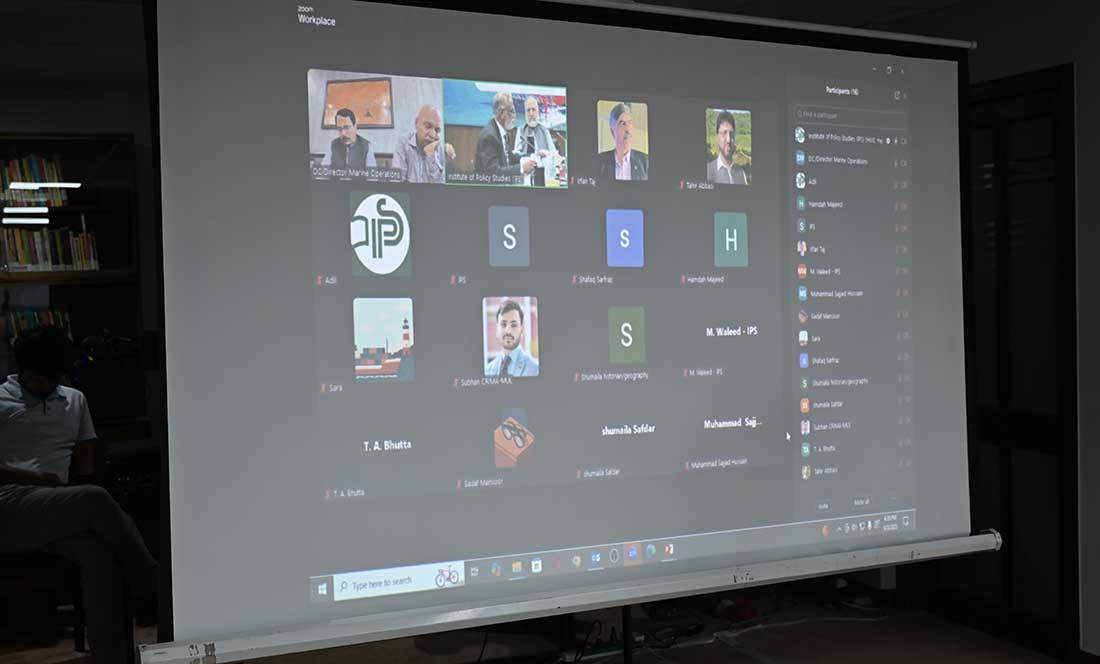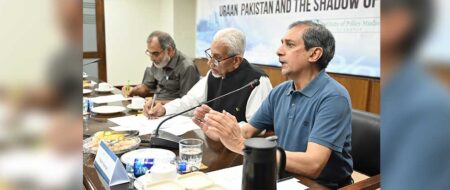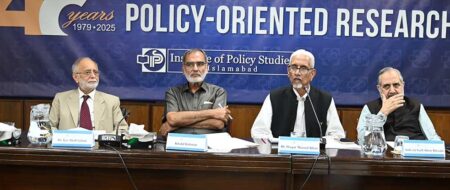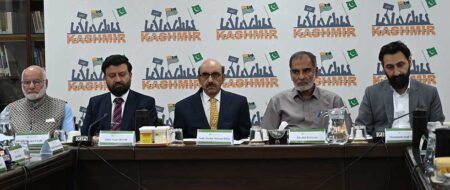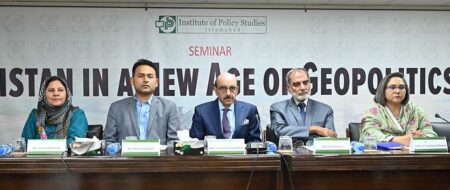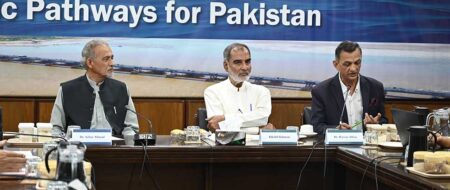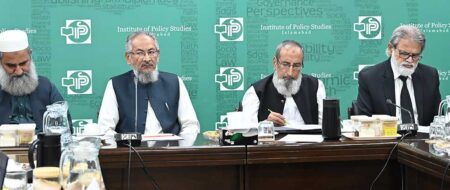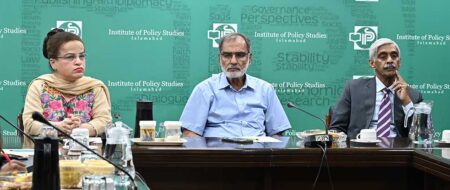Regulatory harmonization, IMO compliance critical to unlock maritime potential: Experts
As Pakistan seeks to align itself with evolving global maritime standards, there is an urgent need for structural modernization, regulatory harmonization, and sustained compliance with International Maritime Organization (IMO) regulations. Achieving this will require cohesive legal reforms, inter-ministerial coordination, and greater private-sector engagement to position the country as a competitive and sustainable maritime nation.
These views were shared during a roundtable titled “Navigating IMO Regulations: Opportunities and Strategies for Pakistan’s Shipping Industry,” held at the Institute of Policy Studies (IPS), Islamabad, in observance of World Oceans Day, on June 03, 2025. The session featured speakers, including Cdre (r) Jawad Akhtar, maritime policy advisor, Ministry of Maritime Affairs, Cdre (r) Irfan Taj, maritime strategist and consultant, Ali Tauqeer Sheikh, member, National Climate Change Council, Shahzad Atta, director (legal), Ministry of Maritime Affairs, Khalid Rahman, chairman, IPS, and Ambassador (r) Syed Abrar Hussain, vice chairman, IPS.
Cdre (r) Jawad Akhtar outlined Pakistan’s recent maritime achievements and its progress toward aligning with IMO standards, emphasizing the potential to expand maritime trade to over $100 billion through structural modernization and regulatory reforms. He highlighted the revival plan for the Gadani ship-breaking yard, which generated revenue of Rs6 billion last year, down from Rs21 billion in 2020-21, as it is not in full compliance with the Hong Kong Convention. Key developments include Pakistan’s first unified fishing policy, approval for PNSC to acquire four IMO-compliant ships, accession to the Hong Kong Convention, and legal reforms for key port and shipping ordinances.
Akhtar stressed the need for gradual but sustained IMO compliance and addressed outdated laws, lack of engagement, and data reporting gaps. He called for modernized port procedures and public maritime surveys to restore global confidence, especially ahead of IMO Council elections. He advocated a harmonized approach involving think tanks, inter-ministerial coordination, updated legal frameworks, and full accession to pending IMO conventions to ensure sustainable maritime growth.
Shahzad Atta endorsed these views and pointed to significant legal ambiguities and institutional disconnects that complicate enforcement and hinder investment in green shipping infrastructure. He emphasized the political and constitutional complexities introduced by the 18th Amendment, noting that the federal government cannot override provincial jurisdiction without proper consultation. He added that international conventions do not address internal divisions of responsibility, complicating their domestication. Atta praised the successful domestication of the Hong Kong Convention without foreign technical assistance but cautioned against underestimating the challenges of future ratifications.
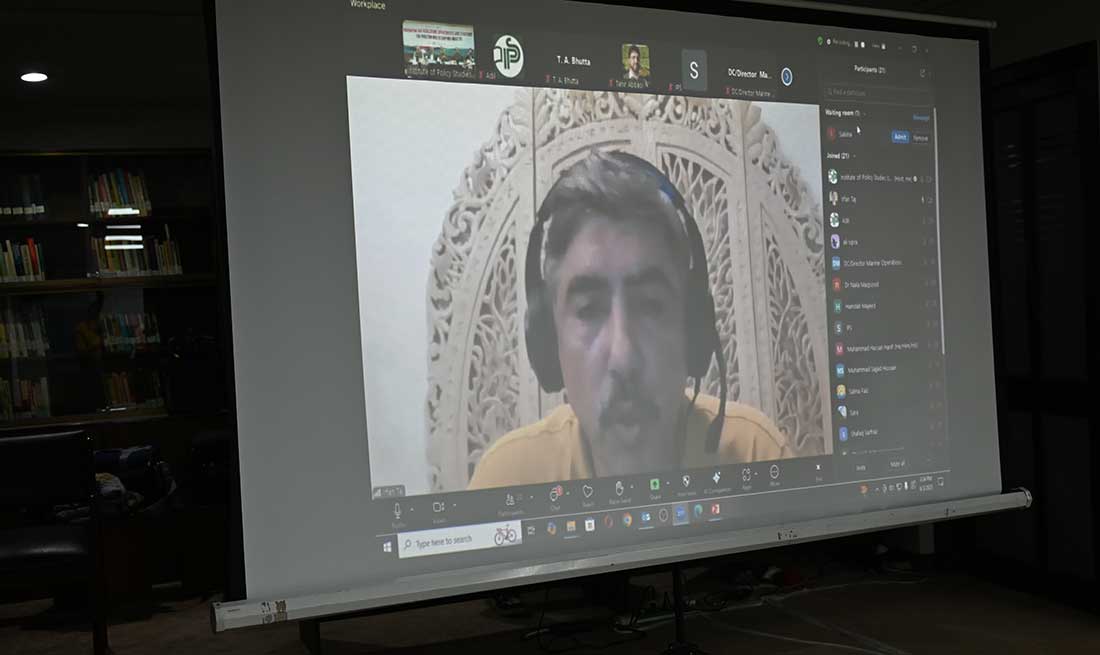
Cdre (r) Irfan Taj emphasized that meeting IMO greenhouse gas targets is not just a climate obligation but vital for Pakistan’s maritime competitiveness. Non-compliance, he warned, could lead to dependence on foreign shipping lines and exclusion from global trade routes. He advocated treating PNSC as a commercial entity, revitalizing seafarer development, and modernizing port infrastructure to support green fuels. Taj proposed privatizing port operations, fostering international partnerships, and establishing a national carbon credit framework. He also stressed the need for policy continuity, regulatory clarity, and cross-sector coordination to drive a business-led, resilient, and sustainable maritime transition that aligns with global standards.
Ali Tauqeer Sheikh made a strong business case for engaging the private sector in Pakistan’s maritime transition. He noted that a climate-smart maritime sector is not only an environmental necessity but also an economic imperative. Citing international examples from Belgium, Norway, India, and Sri Lanka, he advocated for public-private partnerships and digitization as essential for fostering innovation, efficiency, and green investment in the port and shipping sectors. He also emphasized the need for an inclusive and consultative policy framework.
Concluding the roundtable, Khalid Rahman welcomed the diversity of perspectives and the growing momentum for reform in the maritime sector. He stressed that policy consistency and regulatory predictability are crucial for building investor confidence, attracting long-term investment, and sustaining meaningful reform. He also underscored the importance of involving the private sector in policymaking to ensure a smooth and effective maritime transition.
